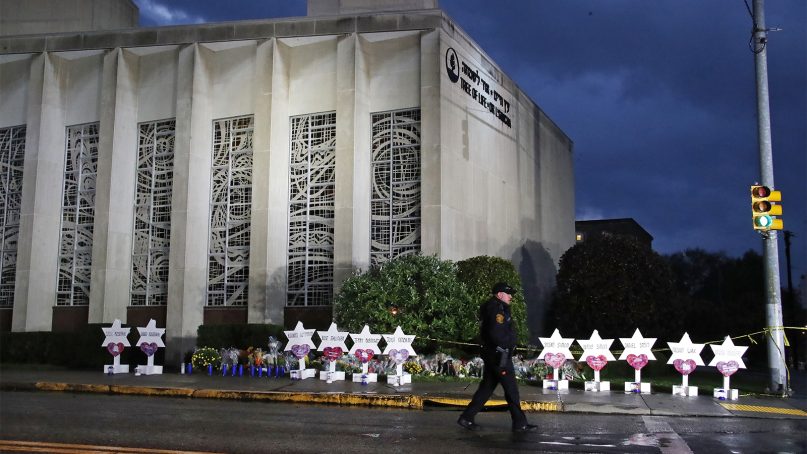(RNS) — On Oct. 27, 2018, federal prosecutors say Robert Bowers, driven by antisemitism and fueled by extreme right-wing hate conspiracy theories, killed 11 Jews in a Pittsburgh synagogue. It was the most violent antisemitic act in American history, devastating the families of the murdered and wounded victims as well as their synagogue communities and deeply alarming American Jewry and other vulnerable communities.
Bowers’ trial is scheduled to begin in coming weeks, with the jury selection process already underway. Before the trial opens, the U.S. Department of Justice must answer two vital questions of a civilized community: Who deserves to live or die? And who should make that decision?
The Biden administration seems conflicted. In the case of Sayfullo Saipov, who killed eight people with a truck on a New York City bike path in 2017, DOJ decided to seek the death penalty, but the jury couldn’t find unanimity on the sentence, so Saipov will receive life in prison without the possibility of release.
DOJ did not seek capital punishment for Patrick Crusius, who, motivated by racism, killed 23 people, most of them Hispanic, in an El Paso Walmart in 2019. Both Saipov and Crusius offered to plead guilty in exchange for life in prison without parole; only Crusius was given the opportunity to do so.
Is there a certain “angels on the head of a pin” aspect to trying to distinguish who is deserving of execution?

This undated photo shows Robert Bowers, the suspect in the deadly shooting at the Tree of Life Synagogue in Pittsburgh on Oct. 27, 2018. Photo courtesy of Pennsylvania Department of Transportation
Bowers also offered to plead guilty in exchange for life behind bars but the offer was rejected by the Trump administration.
The Biden administration now needs to accept his offer. Both President Joe Biden and Attorney General Merrick Garland have expressed serious concerns about the death penalty. And in this instance they should consider the guidance of the collective wisdom of Jewish institutions.
American Jews are no more monolithic than any other racial or ethnic group. The families of the Tree of Life victims themselves are divided on whether the death penalty should be pursued. I certainly empathize with those who call for the death penalty for this terrible crime. Yet, major Jewish organizations are remarkably consistent in their opposition to the death penalty — both conceptually and as it is currently implemented in the United States.
One of the congregations attacked at Tree of Life that day belonged to the Reconstructionist movement, and one of that congregation’s members, a highly regarded doctor, was killed. Noting that “Jewish tradition is weighted heavily against the use of the death penalty,” the congregation has called for a plea bargain for life without parole for Bowers.
The Reform and Conservative movements have condemned capital punishment altogether as “repugnant” or “a stain upon civilization and our religious conscience.” In 2001, the Jewish Council for Public Affairs, representing a large number of national and local Jewish organizations, including the congregational arms of the Conservative, Orthodox and Reform movements, passed a resolution calling for a moratorium on the death penalty, emphasizing the racial and economic disparities in its application, the cruelty of specific methods of capital punishment and the innocent people who have been put to death.
Many of these groups have pointed out that although the Bible sanctioned capital punishment, the rabbis have, through banning confessions to capital crimes and by imposing virtually unattainably stringent procedural standards for conviction, functionally prevented capital punishment for nearly 2,000 years.
Gross inequities and errors infuse the system of capital punishment in America — consider only the 191 exonerations or freeing with dismissal of charges of death row inmates since 1974. Our history has painfully demonstrated that so long as the death penalty is used at all, even for those you and I may view as the worst of the worst, this system, replete with innate biases, racial disparities, inaccuracies, and prosecutorial and police misconduct, will result in injustices. Tree of Life is a case without issues of racial disparities and with no doubt as to factual guilt. But for those who view the death penalty as an immoral act of a civilized society, opposition must apply to all cases.
As with the rabbis of old, the only way to ensure that, at long last, we can finally end death penalty injustices is to bar capital punishment altogether.

David Saperstein. Courtesy photo
Nearly two millennia ago, the Talmud observed: “The one who saves a life, saves the world. The one who destroys a life, destroys the world.” Bowers ended and upended the worlds of many. Yet if a civilized society can find ways other than taking a life to punish even the very worst of evildoers, we will model, and are helping save, a world that truly cherishes life.
(David Saperstein, a rabbi and a lawyer, is director emeritus of the Religious Action Center of Reform Judaism. The views expressed in this commentary do not necessarily reflect those of Religion News Service.)





